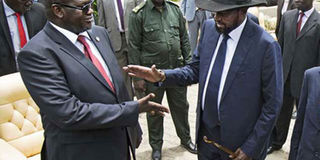Breaking News: At least 10 feared to have drowned in Makueni river
South Sudan peace talks show great promise

South Sudan's former Vice-President Riek Machar (left) and President Salva Kiir in Juba on April 29, 2016. PHOTO | ALBERT GONZALEZ FARRAN | AFP
What you need to know:
- In Pretoria, South Africa, Mr Odinga met with rebel leader Riek Machar to get his side of the story.
Mr Odinga met with President Salva Kiir two weeks ago ostensibly to discuss security and stability of the region, according to his office.
On Friday, Dr Machar insisted on resolving the conflict by peaceful means, but spoke in parables.
Opposition leader Raila Odinga’s quest for a peaceful South Sudan has achieved the latest sign yet that warring parties could meet face to face before the end of this month.
In Pretoria, South Africa, Mr Odinga who is currently Kenya’s de facto special envoy to South Sudan conflict met with rebel leader Riek Machar to get his side of the story.
Mr Odinga met with President Salva Kiir two weeks ago ostensibly to discuss security and stability of the region, according to his office. But details emerged of Mr Kiir agreeing to efforts for a meeting between the two warring leaders in a bid to iron out the long running conflict.
On Friday, Dr Machar insisted on resolving the conflict by peaceful means, but spoke in parables.
‘‘I have had a fruitful discussion with Hon Raila Odinga in the quest for peace in our country.
PEACEFUL RESOLUTION OF CONFLICT
“The IO (those in opposition) and myself (sic) have been advocating for this peaceful resolution of the conflict. The status quo shouldn’t stand. Something will change,” the former First Vice President said in a post on Twitter.
Mr Odinga on his part said the meeting at the Johnny Makhathini Diplomatic Guesthouse, Pretoria, was a continuation of efforts to bring parties together.
“Today, I held a meeting with former South Sudanese Vice President Dr Riek Machar in South Africa. This is part of the efforts to reconcile the warring parties in SS with the view of ending years of civil war that has crippled the world’s newest country.”
Sources told the Nation Dr Machar agreed to meet with Mr Kiir but first wants his security assured. In return, Mr Odinga, with blessings from President Uhuru Kenyatta, offered to protect rebel leaders living in Kenya as well as Dr Machar when he travels to Nairobi.
REBEL ACTIVISTS
The offer is a slight departure from the undeclared policy by Nairobi which has in the past looked on as rebel activists are kidnapped and deported to South Sudan. In November 2016, for example, Dr Machar’s spokesman James Dak was mysteriously deported from Nairobi even as Kenyan security agencies claimed they played no role in the affair.
In January last year, two more Machar allies were arrested in the streets of Nairobi and deported to South Sudan. Despite a court order requiring authorities to present them to court, the two were never produced.
“It is being done in good faith in the hope that it can encourage honest participation,” said a Kenyan diplomatic source who insisted on speaking in the background as he was not authorised to divulge details.
“Security guarantees could be a good catalyst but we wait to see if other issues will be ironed out.”
HOUSE ARREST
Dr Machar has been under house arrest since he fled Juba in July 2016 when the deal he had signed with Kiir to form a transitional government collapsed.
Regional bloc, the Intergovernmental Authority on Development, IGAD, which midwifed the first deal, has been trying to have parties renegotiate a second agreement under a platform called the High Level Revitalisation Forum (HLRF).
Last week, the latest phase of the Forum ended without success after parties rejected a ‘common ground’ proposed by IGAD, but which would have ballooned the transitional government to accommodate splinter groups.
Ahead of the African Union Summit due in Mauritania next month, IGAD Council of ministers last week said the two warring leaders should meet face to face, and agreed to have Dr Machar be released from house arrest.
Mabior Garang, Chairman of the rebel (SPLM/IO) committee on public information said they welcome the announcement by Sudan to host the meeting.
However, the rebel leaders were quick to assert their right to self defence which could easily mean possibility of renewed violence.
CHANGE VENUES
Sudanese Foreign Minister al-Dirdiri Mohamed Ahmed, in a message delivered to President Salva Kiir said Khartoum was ready to host the two.
A new location could mean the region attempting to change venues and mediators in a bid to reach a solution. For example, while rebels generally liked Addis Ababa, there was fear that the peace talks had been turned into mere chats without a solution. Al-Bashir could be interested in having his southern neighbours agree as soon as possible.
Khartoum and Juba used to be one country before cessation in July 2011. Sudan built a pipeline to export oil from the South. War and violence means no one benefits from this infrastructure.
In addition, Sudan had been hosting thousands of refugees from the South and would want the war to end so that remaining issues on cessation such as the actual complete flow of their border can be finalised.





